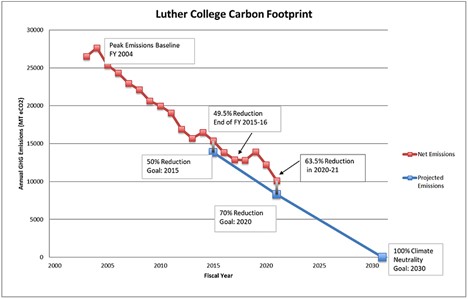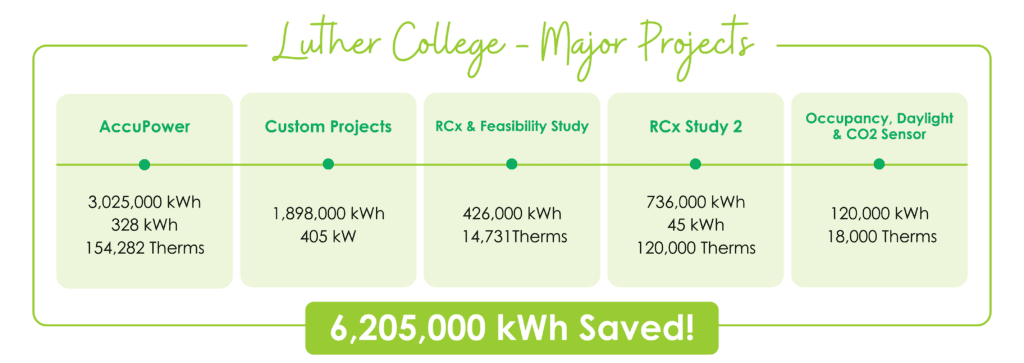Luther College has a deep commitment to sustainability and a goal to integrate it into all areas of campus life. In response to the President’s Climate Commitment, Luther College set a carbon neutrality date of 2030 and developed its own Climate Action Plan to achieve its goals. Michaels Energy is a trusted partner for Luther College and regularly works with them on action items for this commitment. Together with their local utility, Luther College and Michaels Energy identify ways to save energy and continue their sustainability efforts.
Initial Findings
Michaels conducted a campus-wide RCx study on the student union, library, athletic center, labs, and academic buildings. Opportunities for energy savings were found with controls on air handling systems and lab exhaust systems. Implementing the projects identified in the RCx study helped create a comfortable building environment for students and faculty. Lower airflow rates kept rooms from getting stuffy, which helped occupants become more comfortable. This was just one study among many aimed at finding new ways for Luther College to save energy across its campus.
Types of Projects
Since 1999, Michaels has worked on a variety of decarbonization projects for the college, including:
- Campus-wide building automation software (BAS) design, commissioning measurement and verification
- Mechanical, electrical and plumbing (MEP) design, project management, commissioning
- HVAC Master Plan to Decarbonization
- HVAC and chiller replacements
- New science lab LEED
Real Decarbonization Results
- $130,000+ savings from the RCx study
- 50% overall energy savings
- 72% carbon reduction
- 3 GWh energy reduction
- 4.7 MW/month decrease in demand
- 154,000 therm savings
- 70+ contracts
As of February 2023, Luther College has reduced its carbon emissions by 72% as shown in the chart below. Of note, the performance contract led by the expertise of Michaels Energy started and continuously funded the progress. The key to deep decarbonization is identifying the waste streams, “the low hanging fruit,” and directing those dollars back into more and more waste and carbon reduction.

“Working with Michaels Energy on RCx has been very fruitful for Luther College. We continue to see the benefits of the process in lower energy consumption. As we work towards our carbon footprint reduction goals, these types of energy efficiency projects will continue to be important.” -Jay Uthoff, Director of Facilities at Luther College
To download a copy of the case study, click here.



